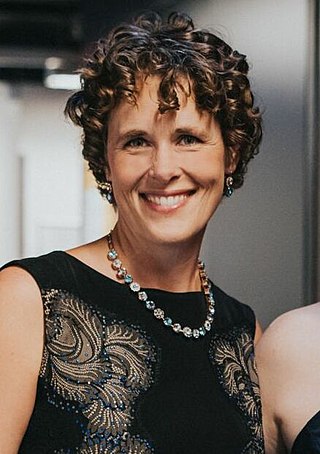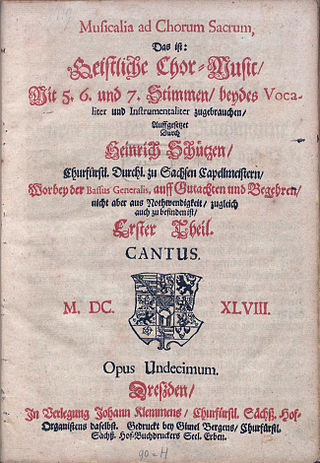Related Research Articles
Jan Dismas Zelenka, baptised Jan Lukáš Zelenka was a Czech composer and musician of the Baroque period. His music is admired for its harmonic inventiveness and mastery of counterpoint.
Jürgen Budday is a German conductor, director of church music and music teacher. He is artistic director of the concert series at the UNESCO World Heritage Site Maulbronn Abbey, of the choir 'Maulbronner Kantorei' and of the Maulbronn Chamber Choir.

Hille Perl is a German virtuoso performer of the viola da gamba and lirone.

Akademie für Alte Musik Berlin is a German chamber orchestra founded in East Berlin in 1982. Each year Akamus gives approximately 100 concerts, ranging from small chamber works to large-scale symphonic pieces in Europe's musical centers as well as on tours in Asia, North America and South America.

Rudolf Mauersberger was a German choral conductor and composer. His younger brother Erhard was also a conductor and composer.
The Maulbronn Chamber Choir was founded in 1983 and is directed by Jürgen Budday.
Marcus Ullmann is a German classical tenor.
Gerlinde Sämann is a German soprano known for her performances in concerts and operas. She is particularly associated with the works of Johann Sebastian Bach. Her concert repertoire also includes lieder, oratorio, early music, and contemporary music.
Manfred Cordes is a German conductor of early music, musicologist and teacher. He is professor at the Hochschule für Künste Bremen and was its rector from 2007 to 2012.

Marianne Beate Kielland, is a Norwegian mezzo-soprano. In 2009, she was awarded the Nordlysprisen.

Hans-Christoph Rademann is a German choral conductor, currently the director of the Dresdner Kammerchor and the Internationale Bachakademie Stuttgart.

Frieder Bernius is a German conductor, the founder and director of the chamber choir Kammerchor Stuttgart, founded in 1968. They became leaders for historically informed performances. He founded the Stuttgart festival of Baroque music, "Internationale Festtage Alter Musik", in 1987, and is a recipient of the Edison Award (1990), Diapason d'Or (1990) and the Order of Merit of the Federal Republic of Germany (1993).
Die sieben Worte Jesu Christi am Kreuz, SWV 478, is a German-language musical setting of the seven sayings of Jesus on the cross by Heinrich Schütz. It was written in Weissenfels around 1645 and revised in 1657. Schütz set the text of the biblical words in their context, framed by two stanzas from Johann Böschenstein's hymn "Da Jesus an dem Kreuze stund", as an oratorio or Passion cantata. He scored it for five voices (SATTB), five instrumental parts and continuo. The original title reads: Die Sieben Worte unsers lieben Erlösers u. Seeligmachers Jesu Christi, so er am Stamm des Hl. Kreuzes gesprochen.

Psalmen Davids is a collection of sacred choral music, settings mostly of psalms in German by Heinrich Schütz, who had studied the Venetian polychoral style with Giovanni Gabrieli. Book 1 was printed in Dresden in 1619 as his Opus 2. It comprises 26 individual settings, which were assigned numbers 22 to 47 in the Schütz-Werke-Verzeichnis (SWV). Most of them use the text of a complete psalm in the translation by Martin Luther.
David Erler is a German countertenor, a male classical singer in the alto vocal range, specialising in Baroque music in historically informed performance. He is also a music editor for Breitkopf & Härtel.
Georg Poplutz is a German tenor, a soloist in Baroque music, opera and oratorio, and a Lied singer. He has been a member of vocal ensembles such as Johann Rosenmüller Ensemble and Cantus Cölln, and has participated in a project to record the complete works of Heinrich Schütz.

Geistliche Chormusik is a collection of motets on German texts for choir by Heinrich Schütz. It was printed in Dresden in 1648 as his Opus Undecimum, and comprises 29 individual settings for five to seven voices, which were assigned numbers 369 to 397 in the Schütz-Werke-Verzeichnis (SWV). The original title was Geistliche Chor-Music, Erster Theil which indicates that Schütz planned a second part. It is also known as Geistliche Chor-Music 1648. The collection contains earlier and new works and a German arrangement of a motet by Andrea Gabrieli.

Rheingauer Kantorei, now Neue Rheingauer Kantorei, is a mixed choir of the Rheingau region in Germany, performing mostly sacred music in services and concerts.

Johannes Hill is a German baritone in concert and in oratorios, who has performed internationally. Singing in choirs from age 10, he has performed major roles in oratorios, such as both Jesus and Pilate in Bach's Passions, and Pope Francis in the premiere of Laudato si'. He has also performed in vocal ensembles such as Kammerchor Stuttgart and Collegium Vocale Gent.
The Rheinische Kantorei is a German vocal ensemble of baroque music accompanied by an instrumental ensemble called Das Kleine Konzert.
References
- ↑ "Dresdner Kammerchor". Hochschule für Musik "Carl Maria von Weber". 2011. Retrieved 27 December 2011.
- 1 2 "Dresdner Kammerchor (Chamber Choir)". bach-cantatas.com. 2010. Retrieved 27 December 2011.
- ↑ David Vernier (2010). "Bach: Christmas Oratorio / Chailly, Gewandhausorcheser, Dresdner Kammerchor". arkivmusic.com. Retrieved 27 December 2011.
- ↑ "Das Werk: Paulus im Radio" (in German). paulus2011.wordpress.com. 29 May 2011. Archived from the original on 24 April 2012. Retrieved 27 December 2011.
- ↑ "Dresdner Kammerchor: Nachtklänge". goerlitz-tourismus.de. 7 November 2011. Retrieved 27 December 2011.